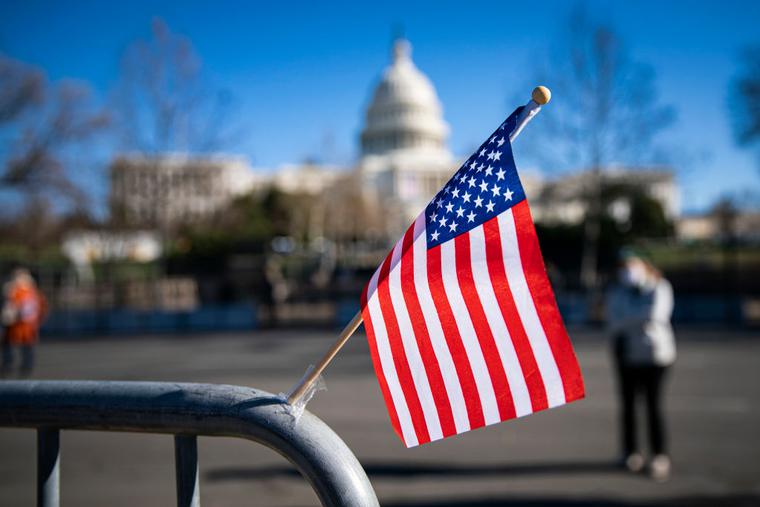Re-Reading Father Richard Neuhaus’ ‘American Babylon’ in Light of U.S. Capitol Attack
COMMENTARY: Father Neuhaus, who died in 2009, Father Richard had great faith in the American people, but he would have been worried these last years, and last Wednesday.

The late Father Richard John Neuhaus was a friend and mentor, and around his death anniversary (Jan. 8, 2009) I usually dip into one of his books as a way of remembering him.
Earlier this week, reorganizing my books, I came across his last book, American Babylon: Notes of a Christian Exile, published posthumously in March 2009. That was Tuesday. On Wednesday came the assault on the Capitol.
It seemed providential to be re-reading those pages as death and desecration came to the Capitol. And not without sadness, for Father Richard loved the United States of America, and would have been heart-broken about the violence in Washington.
“I am somewhat uneasy with that choice of title,” Father Richard wrote in American Babylon. “Too many people, and not only Americans, are all too ready to identify America with Babylon. … America is Babylon not by comparison with other societies but by comparison with that radically new order sought by all who know love’s grief in refusing to settle for a community of less than truth and justice uncompromised.”
No political order offers truth and justice uncompromised, but recently in the U.S. both have seem in unusually short supply.
Fallen, fallen is Babylon the great. — Revelation 18:2
The United States of America did not fall on Wednesday at the Capitol. But it is part of a fallen order, where truth and justice always lack. Restoring truth and justice is in part the work of politics. But only in part.
Father Richard was intensely engaged in American political life, from the civil rights movement of the 1960s and the antiwar protests of the 1970s, to becoming a champion of the pro-life movement in the 1990s. It was not unusual then for people to propose to him this or that candidate as particularly promising. In response he always had two responses.
The first was biblical wisdom: Put not your trust in princes (Psalm 146:3).
The second was one of his sage, if wistful, aphorisms: Given time, he too will betray us…
Father Richard’s engagement in political activism never led him to messianic politics. He died after Barack Obama’s election but before his inauguration, and long before the current president came down the escalator at Trump Tower. He was suspicious of the messianic dimension of Obama’s candidacy and would have been troubled by those who regarded Donald Trump as having some kind of messianic anointing.
Father Richard would have been dismayed at the apocalyptic tone of politics today. The future of the republic does not hang on a presidential election, let alone a senate election in Georgia. Elections have consequences, sometimes, grave consequences, but electoral politics does not heal a corrupt culture.
“Moral progress is far from being self-evident,” Father Richard wrote. “We should at least be open to the possibility that we are today witnessing not moral progress but a dramatic moral regression.”
That possibility was the risk of freedom, and Father Richard knew well that the great American experiment in ordered liberty was just that, an experiment, which would be tested. His commitment to the pro-life cause made him all too aware that that test could be failed.
American Babylon devotes considerable attention to the 2007 encyclical of Pope Benedict XVI, Spe Salvi (Saved in Hope). In that document, the Holy Father explores how the Christian works diligently for the common good in political life, but does not put his hope in politics. Father Richard suggested 12 years ago that too many Americans were doing just that; the warning is all the more needed today.
“Freedom presupposes that in fundamental decisions every person and every generation is a new beginning,” he quotes Benedict from Spe Salvi (24). “Naturally, new generations can build on the knowledge and experience of those who went before, and they can draw upon the moral treasury of the whole of humanity. But they can also reject it, because it can never be self-evident in the same way as material inventions. The moral treasury of humanity is not readily at hand like tools that we use; it is present as an appeal to freedom and a possibility for it.”
Towards the end of American Babylon, Father Richard turns toward “politics for the time being,” his reflections on the U.S. constitutional and democratic order, for which he had great esteem.
“There is, of course, a necessary concern about unbridled populism, raw majoritarianism, and the dangers of demagoguery,” he wrote in 2009. “The framers of our constitutional order were keenly aware of these dangers. Hence our system of representation, checks and balances, staggered elections, vetoes, overrides, judicial review, and other mechanisms conducive to a more sober deliberation of how we ought to order our life together.”
Father Richard argued passionately for decades against a “judicial usurpation of politics” in which the Constitution meant simply what a majority of justices decided it meant. He would have been aghast that influential voices at different places on the political spectrum now think the Constitution means whatever is convenient for their agenda at the moment.
Father Richard had great faith in the American people, but he would have been worried these last years and last Wednesday.
“Our constitutional order is not a machine that runs itself,” he wrote. “It depends on the cultivation of restraint, civility, and disciplined reason, which are always in short supply. And we do well to keep in mind that the wisest of our public philosophers, from Alexis de Tocqueville onward, cautioned not only against the tyranny of the majority but also the tyranny of the minority.”
Father Richard was one of those wise public philosophers. We could use a double portion of his wisdom now.

















